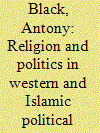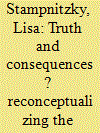| Srl | Item |
| 1 |
ID:
095300


|
|
|
|
|
| Publication |
2010.
|
| Summary/Abstract |
Early Christianity viewed religion and politics as largely separate; early Islam viewed them as largely concurrent. But from the eighth to the eleventh centuries each modified their original position, so that they almost converged. However, they subsequently diverged again. This was because, in the West, political thought became secularised following the eleventh-century papal reform movement and then the Protestant Reformation. Muslim thinkers, on the other hand, beginning with al-Mawardi (974-1058), sought to restore the subsumption of politics into religion, notably during the sixteenth-century Shi'ite revolution in Iran. While today the West views religion and politics as largely separate categories, Muslims see them as necessarily intertwined; attempts to separate them have so far largely failed. Hence Muslim political thought is based primarily on revelation (interpreted in various ways), while Western political thought is based on philosophy.
|
|
|
|
|
|
|
|
|
|
|
|
|
|
|
|
| 2 |
ID:
175370


|
|
|
|
|
| Summary/Abstract |
Secrecy, especially state secrecy, has taken on increasing interest for scholars of international relations and security studies. However, even with interest in secrecy on the rise, there has been little explicit attention paid to exposure. The breaking of secrecy has generally been relegated to the role of a mere ‘switch’, whose internal workings and variations are of little consequence. This article argues that exposure is a significant process in its own right, and introduces a new conceptualization of exposure as a socially and politically constructed process, one that must be ‘thickly described’ if we are to understand how it occurs and has effects. I differentiate the process of exposure into two distinct aspects, reserving the concept of exposure to refer to releases of information, while introducing the concept of revelation to refer to a collective recognition that something has been exposed. The first part of the article explores existing understandings of secrecy and exposure to demonstrate why a new framework is needed, while the second part applies this framework to a case study of the exposure of the use of torture in the post-9/11 US ‘war on terror’.
|
|
|
|
|
|
|
|
|
|
|
|
|
|
|
|